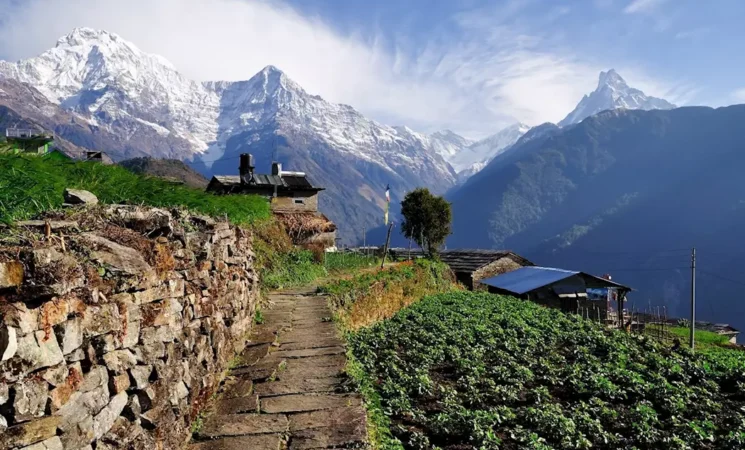10 September 2024, NIICE Commentary 9569
Sabina Pradhan
Tourism has long been recognized as a key sector for economic development, particularly in rural areas such as Ghandruk Village in Nepal. This study explores the significant but often overlooked role of women in the tourism industry, shedding light on their contributions, challenges, and empowerment. Through field visits, interviews with local stakeholders, and a review of governmental and organizational reports, this research aims to examine the gender dynamics within the tourism sector and provide recommendations for policy improvement.
Challenges of Nepali Women in Tourism
Women in Ghandruk face unique challenges in the tourism industry, primarily stemming from traditional gender roles and family responsibilities. Often confined to their roles as daughters, sisters, mothers, and grandmothers, women are expected to prioritize domestic duties over professional opportunities. The dual burden of family and work leaves many unable to fully participate in tourism activities, preventing them from showcasing their potential. Additionally, the lack of formal education among both men and women in the region poses a significant challenge, further hindering their ability to advance in the tourism industry.
The study reveals that although there has been some progress, with women beginning to identify their strengths and contribute to tourism, many are still marginalized. This lack of participation not only stifles their empowerment but also negatively impacts the tourism sector as a whole. The industry suffers when women's contributions are limited, leading to an underutilized workforce and a failure to fully capitalize on the sector’s potential.
Empowerment and Mobility
Despite these challenges, the study highlights the mobility and empowerment of women who have begun breaking out of traditional roles. Women in Ghandruk are increasingly participating as guides and porters, roles traditionally dominated by men. However, this progress is met with resistance. Women in these positions often face criticism and societal pressure, forcing some to leave their jobs. The lack of support and encouragement from their communities adds another layer of difficulty for women attempting to advance in tourism.
The study suggest that while women are capable of performing the same tasks as men, they are often denied equal opportunities. Those who do manage to enter the sector are frequently held back by social constraints, preventing them from achieving their full potential.
Lack of Coordination and Policy Gaps
One of the most significant issues uncovered by the research is the disconnect between policy-makers, employment agencies, and the tourism industry. There is a lack of coordination in addressing the specific needs of women in tourism. Although empowerment has been a central theme in policy discussions, women continue to face exclusion due to inadequate social protection mechanisms such as insurance and security.
Moreover, there is no comprehensive data on the number of women working in the tourism sector, which makes it difficult to create targeted policies to address their needs. Without proper categorization, women remain invisible within the system, and their work goes unrecognized and unsupported.
In order to improve the situation of women in the tourism sector, there is need for coordinated action which may include:
- Increased Government Intervention: The government should implement tourism-specific policies with clear mechanisms for execution, prioritizing the needs of women in the sector.
- Promoting Education: Establishing more schools and educational institutions in rural areas like Ghandruk is crucial to improving literacy rates and empowering both men and women.
- Promoting Gender Equality: Agencies must collaborate to promote and maintain gender equality in tourism through awareness programs, skill development, and job security measures.
- Providing Life Skill Training: Providing life skills and empowerment strategies, with regular follow-ups, will equip women to succeed in the tourism industry.
- Providing Human and Job Security: Addressing concerns of human and job security, particularly for women working as guides and porters, is vital to their well-being and sustained participation.
- Promoting Conservation and Cultural Heritage: Promote the conservation of natural and cultural heritage by embracing the diversity of women’s contributions to tourism.
- Emphasizing Good Governance: Emphasizing transparency, accountability, and participation in tourism governance will help eliminate corruption and improve the overall welfare of workers.
- Improved Infrastructure: Better transportation and road infrastructure are essential to providing local people with access to tourism opportunities.
- Organizing Awareness Campaigns: High-level seminars, workshops, and exhibitions can raise awareness about the opportunities for women in rural tourism and encourage their active involvement.
- Policy and Gender Empowerment: Developing local frameworks to promote gender empowerment in tourism is necessary where such policies are currently lacking.
- Increased Tourism Organizations’ Role: National tourism organizations and boards should expand their roles beyond marketing to include promoting women’s participation in the sector.
Conclusion
The tourism sector in Ghandruk Village holds immense potential for empowering women and enhancing economic development. However, significant challenges remain, including traditional gender roles, lack of education, and inadequate policy support. Addressing these issues requires coordinated efforts from the government, agencies, and communities to create a more inclusive and supportive environment for women in tourism. By empowering women, not only will their lives improve, but the entire tourism industry will benefit from their contributions.
There is a need to call for more research and policy development focused on women in the tourism sector. There is the need for better data collection, gender-sensitive policies, and enhanced cooperation between all stakeholders to ensure that women can fully participate and thrive in Nepal’s tourism industry.
Sabina Pradhan is a Research Associate at NIICE.

